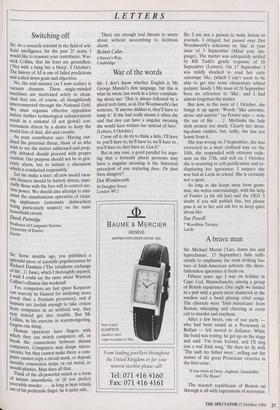Sir: Some months ago, you published a splendid piece of
scientific popularisation by Richard Dawkins (`The telephone exchange of life', 11 June), which I thoroughly enjoyed. I wish I could say the same about Warwick Collins's effusion this weekend!
Yes, computers are fast (poor Kasparov Can scarcely be blamed for analysing more slowly than a Pentium processor), and if humans are foolish enough to take orders from computers in an artificial way, they may indeed get into trouble. But. Mr Collins, in his exercise in scaremongering, forgets one thing. Human operators have fingers with which they can switch computers off, or break the connections between distant computers. Computers may design micro- circuits, but they cannot make them: a com- puter cannot copy a circuit mask, or deposit metallic connection strips, or cut metal, or mould plastics. Man does all that.
Think of the all-powerful switch as a form of instant anaesthesia, or (if you prefer) reversible murder . . . as long as man retains use of his prehensile finger, he is quite safe. There are enough real threats to worry about without succumbing to fictitious alarm.
Robert Cahn 6 Storey's Way, Cambridge


























































 Previous page
Previous page